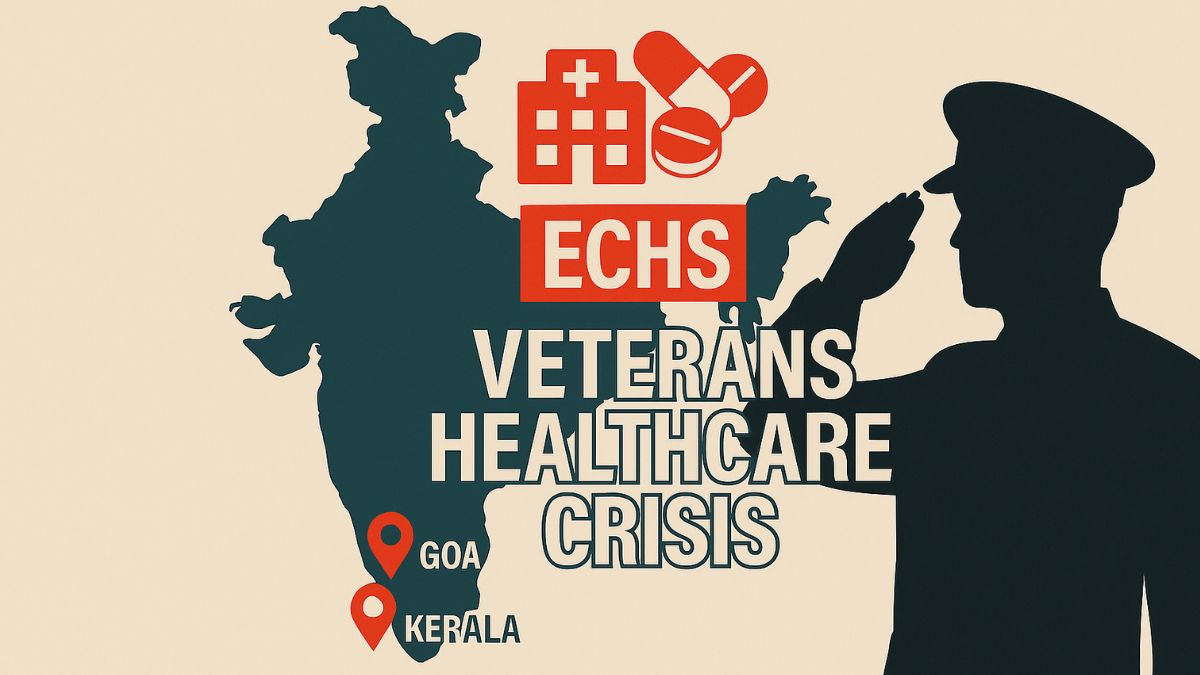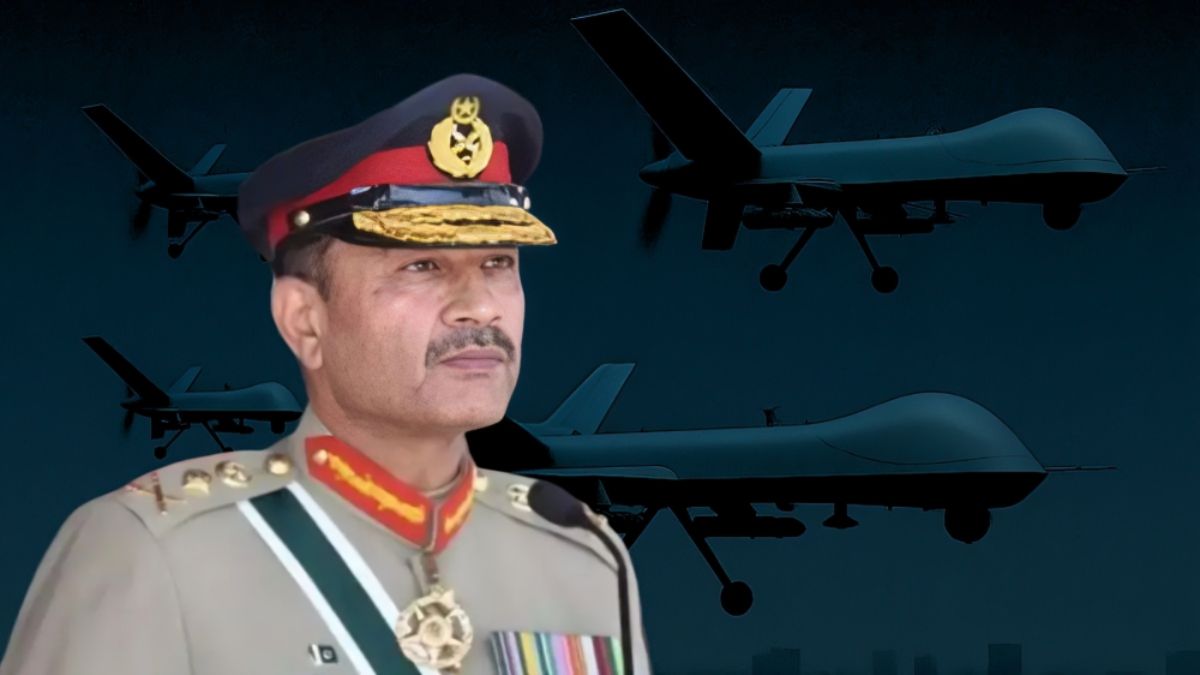Fractured Lifeline: Veterans Struggle With A Broken Healthcare System

ECHS A lifeline promised to veterans, now a broken system leaving thousands in Kerala and Goa struggling for healthcare and dignity. (image courtesy: AI generated image via GPT-5)
Veterans are often hailed as guardians of the nation, with their sacrifices deeply ingrained in the national psyche. When the Ex-Servicemen Contributory Health Scheme (ECHS) was rolled out in 2003, it was intended as more than just a welfare measure; it was a guarantee of dignity.
The idea was simple: provide comprehensive medical care to retired personnel and their dependents through a network of polyclinics and empanelled hospitals.
Two decades on, that promise is crumbling. What was meant to be a lifeline for nearly 50 lakh veterans has become a story of queues that stretch endlessly, medicines that rarely arrive, and reimbursements that vanish into bureaucratic limbo.
For many who once carried arms in service of the Republic, their twilight years are spent waging a different battle—this time against an unresponsive healthcare system.
Breaking point in the states
The cracks have been visible for years, but in some regions they have widened into full-blown crises.
In Kerala, concerns peaked in early 2023 when the Ex-Servicemen Grievances Redressal Cell sounded the alarm. It warned that almost all empanelled hospitals in Kannur and Kozhikode had withdrawn from the scheme, citing massive unpaid bills and package rates frozen for over a decade. At one point, Aster MIMS Hospital in Kozhikode alone was reportedly owed over ₹17 crore.
Veterans, who had already paid hefty sums at retirement—₹1.20 lakh for officers, ₹67,000 for Junior Commissioned Officers, and ₹30,000 for Other Ranks—alongside monthly deductions from their pensions, suddenly found themselves paying out of pocket for treatment.
Reports also pointed to a disquieting trend: rank-based divisions inside hospital wards, where retired officers enjoyed better facilities than fellow veterans of lower ranks.
By 2024, the situation in Kozhikode had further deteriorated. The Kerala State Ex-Services League reported that many private hospitals either refused night admissions or denied care on holidays. Desperately ill patients were often told “no beds available,” while prescribed medicines were substituted with cheaper alternatives from polyclinics, disrupting continuity of treatment.
Veterans’ organisations demanded empanelment of leading hospitals such as Meitra, Starcare, IQRAA, and Malabar, while also pressing for urgent upgrades at the Kozhikode ECHS polyclinic, which caters to more than 40,000 beneficiaries.
The problem is not confined to Kerala. In May 2025, veterans in Goa lodged complaints of endless waiting times, substandard facilities, and dismal service at ECHS-linked hospitals.
The grievances escalated to Defence Minister Rajnath Singh after interventions by the United Veterans Association and local leaders. Singh acknowledged the seriousness of the crisis, while the Chief Minister pledged to personally coordinate with the Ministry of Defence—a rare glimmer of hope for Goa’s ex-servicemen.
Structural fault lines
At the heart of the collapse are structural flaws that have been ignored for too long. Outdated reimbursement rates discourage private hospitals from participating, while chronic delays in settling bills erode their willingness to treat ECHS patients. Polyclinics, stretched thin and understaffed, act as bottlenecks in approving specialised care, while central authorities remain slow to respond.
The outcome is predictable: hospitals ration services, refuse admissions outside regular hours, and reduce standards of care. Meanwhile, polyclinics often run dry on essential medicines, leaving veterans scrambling.
As early as 2020, complaints of “no stock” for prescribed drugs were already commonplace. By 2024, independent reviews confirmed glaring gaps in the availability of treatments for ageing veterans whose healthcare needs were rising sharply.
Even simple procedural issues add to the frustration. Veterans report being asked repeatedly for documents already on file—Aadhaar cards, pension details, bank information—turning what should be a routine check-up into a bureaucratic ordeal.
Charting a way forward
The survival of the ECHS hinges on comprehensive reform rather than piecemeal fixes. Clearing the backlog of hospital dues and revising package rates to reflect present-day costs must be the first step.
Without financial viability, hospitals will continue to walk away from the scheme, leaving veterans stranded. Equally important is strengthening the polyclinics themselves. These facilities require better infrastructure, more doctors and staff, and modern diagnostic capabilities to prevent the endless cycle of referrals and delays that frustrate patients and providers alike.
Streamlining administrative procedures is another urgent need. Digital platforms could replace the repeated paper-trail of Aadhaar cards, pension slips, and bank details, reducing both waiting times and harassment.
Models of on-the-spot grievance redressal, already tested in parts of Assam and West Bengal, show how immediate intervention can restore some trust in the system. Extending these models nationwide would provide veterans with real-time solutions instead of dragging their complaints through months of official indifference.
Access to care must also extend beyond urban centres. For the many veterans living in rural areas, mobile health units and partnerships with AYUSH practitioners could provide a more consistent lifeline. Alongside treatment, the ECHS must invest in research and preventive health measures.
A dedicated centre to track health trends and emerging needs among ex-servicemen would allow policymakers to anticipate rather than react to crises.
Finally, the system’s human resource and supply chains need a reset. Recruitment of doctors and outsourcing pharmacies to reliable private partners could help reduce chronic staff shortages and the frequent absence of essential medicines in polyclinics.
None of this will succeed without the will of the bureaucracy. If reforms remain trapped in bureaucracy, the scheme will continue to wither.
India’s veterans deserve more than token respect on ceremonial occasions; they require a functioning, reliable health system that honours their service with care, not neglect. For those who once defended the nation at its borders, healthcare should not be a battlefield.







